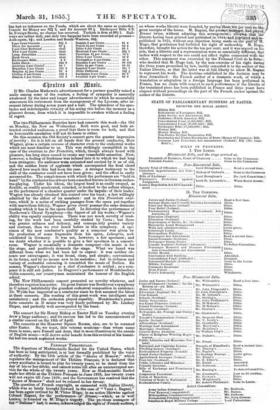The two Philharmonio Societies have hadeoneerts this week—the Old on
Monday, the New on Wednesday. Both were good, and both at- tracted crowded audiences, a-proof that there is room for both, and that an honourable emulation will not do harm to either.
On this occasion the OldSociety's concert gave the, greater impression of novelty : for it is felt on all hands that the present conductor, Herr Wagner, gives a certain newness of character even to the orchestral works which are most familiar to us. This was strikingly exemplified in the case of the overture to Der.Freischiltz, which, though alwaye -heard with pleasure, has long since ceased to create any remarkable sensation. Now; however a feeling of freshnesswas infused into it to which we had' long been stoingers-, the audience 'were animated and excited by it as' of old, and the sudden burst of applause which accompanied the final. chord showed how much this had been the case.- A stronger testimony to the • skill of the conductor could not have been given; and the effect is, easily accounted for. The completeness with which the performers are "held in hand" by the conductor has always been a marked feature in German orches- tra-phiying. Under his baton, the largest band is as easily swayed, as flexible, as readily accelerated, retarded, or hushed to the softest whisper, eel:be performers of a chamber quartet wider the impnlss of their leader. Wagher has already obtained this control over his- band; a fact willingly admitted' by the ablest of its members: and in this Freischits. over- ture, which is a °series a Striking passages from- the opera put together with marvellous felicity, Wagner gives every' passagethe same dramatic reading which it has in the opera itself. In directing the performance of Beethoven's Choral Symphony—the biggest of all his works—Wagner's ability was equally conspicuous. There was not much novelty of read- ing, for the work had been carefully. studied by Costa ; but there was greater softness and delicacy, and consequently greater variety and contrast, than we ever- heard before in this symphony. A spe- cimen of the new conductor's quality as a composer was given by the production of some fragments from his opera, Lohengrin, now celebrated in Germany. It was not, however, a fair 'specimen; and we doubt whether it is possible to give a fair specimen in a concert- room. Wagner is essentially a 'dramatic composer—his musk is for the- stage, and positively demands the,stage.- What we heard was different from what we had been led to expect-. it was neither 'ob- scure nor extravagant; it was broad, clear, and simple; conventional in its forms, and by no means new in-its-mei:Ales; but in richness and variety of .orchestral colouring it -resembled the music of Berlioz. En somme, Wagner's character as a chef d'orchestre is settled ; as a com- poser it is still sub judice. In Bligrove's performance of Mendelssohn's violin concerto, our countryman maintained the honour of the English school.
The New Philharmonic concert presented no novelty whatever, and therefore requires leas notice. Its great feature was Beethoven's symphony in C minor; indubitably the grandest orchestral composition in existence: Wylde has improved as a conductoreinoe he first assumed the baton at-these concerts. His reading of 'this great work was intelligent and satisfactory; and the orchestra played superbly. Mendelesohn's piano- forte- concerto in D minor was very finely performed by, Mr. Lindsay Sloper, and perfectly well accompanied by the-band.


























 Previous page
Previous page